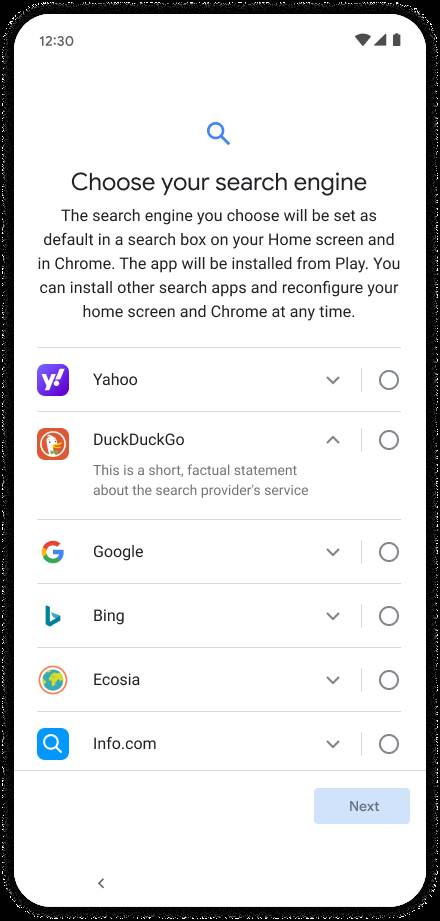Four search providers – DuckDuckGo, Ecosia, Qwant, and Lilo – have penned an open letter to the European Commission claiming that Google is suppressing search engine competition.
The EU has made a number of efforts to counter Google’s search monopoly, including a July 2018 fine and ruling that the company engaged in “illegal tying of Google’s search and browser apps” and “illegal payments conditional on exclusive pre-installation of Google Search.”
Google responded with some licensing changes. In August 2019, it agreed with the EU to provide an Android Choice screen, which included selling spots on the new menu via auction – leading to participants like privacy-centric DuckDuckGo complaining that they were priced out.
The Android Choice screen has since been revised by further agreement with the European Commission, and now features more options and free participation. The new choice screen includes up to 12 search services, with the five most popular search engines in the local country listed first, as recorded by StatCounter, and is free for search providers.
Third-party search providers are not happy. Today’s open letter [PDF] states that “despite recent changes, we do not believe it will move market share significantly.” The providers say that the new Android Choice menu is “only shown once, in a Google-designed, Google-owned onboarding process. If [users] later decide to switch defaults, they must labour through 15+ clicks or factory-reset their phone.” They also complain that Chrome desktop and other operating systems are not included, and worry that “it doesn’t apply to all search aspects points in Android.”
[…]
“In the meantime, at least one search company went bankrupt. A German company called Cliqz invested €100m into building their own search algorithm and they went bankrupt. Google playing on time is a big problem.”
Cliqz said in its farewell post last year: “We failed to convince the political stakeholders, that Europe desperately needs an own independent digital infrastructure. Here we can only hope that someone else picks up the ball… the world needs a private search engine that is not just using Bing or Google in the backend.”
In Russia, Kroll said: “Yandex went down to a 20 per cent market share. Then they had a real choice screen on a fixed date and it went back to 60 per cent. I’m not saying we should do everything like Russia does, but it shows that it can have an effect.”
[…]
Source: Existence of Bing ‘essential’ to non-Google search engines • The Register

Robin Edgar
Organisational Structures | Technology and Science | Military, IT and Lifestyle consultancy | Social, Broadcast & Cross Media | Flying aircraft

